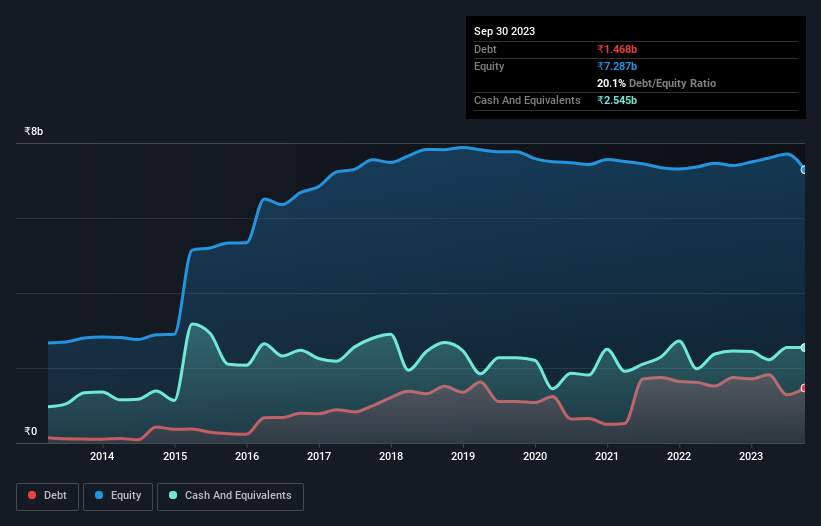
Some say volatility, rather than debt, is the best way to think about risk as an investor, but Warren Buffett famously said that 'Volatility is far from synonymous with risk.' So it seems the smart money knows that debt - which is usually involved in bankruptcies - is a very important factor, when you assess how risky a company is. As with many other companies Ashiana Housing Limited (NSE:ASHIANA) makes use of debt. But should shareholders be worried about its use of debt?
When Is Debt Dangerous?
Debt assists a business until the business has trouble paying it off, either with new capital or with free cash flow. Part and parcel of capitalism is the process of 'creative destruction' where failed businesses are mercilessly liquidated by their bankers. However, a more usual (but still expensive) situation is where a company must dilute shareholders at a cheap share price simply to get debt under control. Having said that, the most common situation is where a company manages its debt reasonably well - and to its own advantage. When we think about a company's use of debt, we first look at cash and debt together.
View our latest analysis for Ashiana Housing
What Is Ashiana Housing's Debt?
You can click the graphic below for the historical numbers, but it shows that Ashiana Housing had ₹1.47b of debt in September 2023, down from ₹1.74b, one year before. However, it does have ₹2.54b in cash offsetting this, leading to net cash of ₹1.08b.

A Look At Ashiana Housing's Liabilities
The latest balance sheet data shows that Ashiana Housing had liabilities of ₹12.9b due within a year, and liabilities of ₹1.86b falling due after that. Offsetting these obligations, it had cash of ₹2.54b as well as receivables valued at ₹401.2m due within 12 months. So it has liabilities totalling ₹11.8b more than its cash and near-term receivables, combined.
Ashiana Housing has a market capitalization of ₹29.9b, so it could very likely raise cash to ameliorate its balance sheet, if the need arose. However, it is still worthwhile taking a close look at its ability to pay off debt. While it does have liabilities worth noting, Ashiana Housing also has more cash than debt, so we're pretty confident it can manage its debt safely.
Although Ashiana Housing made a loss at the EBIT level, last year, it was also good to see that it generated ₹455m in EBIT over the last twelve months. The balance sheet is clearly the area to focus on when you are analysing debt. But you can't view debt in total isolation; since Ashiana Housing will need earnings to service that debt. So when considering debt, it's definitely worth looking at the earnings trend. Click here for an interactive snapshot.
But our final consideration is also important, because a company cannot pay debt with paper profits; it needs cold hard cash. While Ashiana Housing has net cash on its balance sheet, it's still worth taking a look at its ability to convert earnings before interest and tax (EBIT) to free cash flow, to help us understand how quickly it is building (or eroding) that cash balance. Over the last year, Ashiana Housing actually produced more free cash flow than EBIT. That sort of strong cash conversion gets us as excited as the crowd when the beat drops at a Daft Punk concert.
Summing Up
Although Ashiana Housing's balance sheet isn't particularly strong, due to the total liabilities, it is clearly positive to see that it has net cash of ₹1.08b. The cherry on top was that in converted 157% of that EBIT to free cash flow, bringing in ₹714m. So we are not troubled with Ashiana Housing's debt use. Of course, we wouldn't say no to the extra confidence that we'd gain if we knew that Ashiana Housing insiders have been buying shares: if you're on the same wavelength, you can find out if insiders are buying by clicking this link.
When all is said and done, sometimes its easier to focus on companies that don't even need debt. Readers can access a list of growth stocks with zero net debt 100% free, right now.
If you're looking to trade Ashiana Housing, open an account with the lowest-cost platform trusted by professionals, Interactive Brokers.
With clients in over 200 countries and territories, and access to 160 markets, IBKR lets you trade stocks, options, futures, forex, bonds and funds from a single integrated account.
Enjoy no hidden fees, no account minimums, and FX conversion rates as low as 0.03%, far better than what most brokers offer.
Sponsored ContentNew: Manage All Your Stock Portfolios in One Place
We've created the ultimate portfolio companion for stock investors, and it's free.
• Connect an unlimited number of Portfolios and see your total in one currency
• Be alerted to new Warning Signs or Risks via email or mobile
• Track the Fair Value of your stocks
Have feedback on this article? Concerned about the content? Get in touch with us directly. Alternatively, email editorial-team (at) simplywallst.com.
This article by Simply Wall St is general in nature. We provide commentary based on historical data and analyst forecasts only using an unbiased methodology and our articles are not intended to be financial advice. It does not constitute a recommendation to buy or sell any stock, and does not take account of your objectives, or your financial situation. We aim to bring you long-term focused analysis driven by fundamental data. Note that our analysis may not factor in the latest price-sensitive company announcements or qualitative material. Simply Wall St has no position in any stocks mentioned.
About NSEI:ASHIANA
Ashiana Housing
Through its subsidiaries, engages in the real estate development business in India.
Excellent balance sheet average dividend payer.
Similar Companies
Market Insights
Community Narratives



